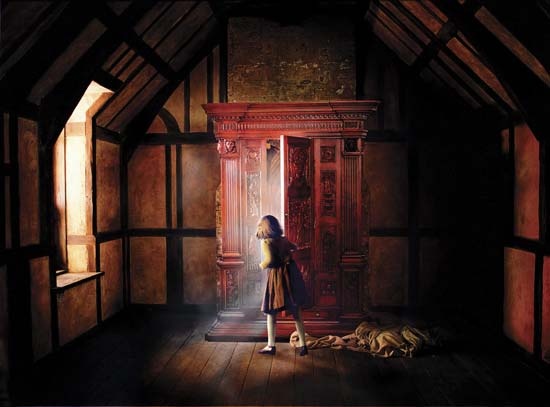Lewis, C.S.
British author
in full Clive Staples Lewis
born Nov. 29, 1898, Belfast, Ire. 【now in Northern Ireland】
died Nov. 22, 1963, Oxford, Oxfordshire, Eng.
 British scholar, novelist, and author of about 40 books, most of them on Christian apologetics, the most widely known being The Screwtape Letters. He also achieved fame with a trilogy of science-fiction novels and with the Chronicles of Narnia, a series of seven children's books that have become classics of fantasy literature.
British scholar, novelist, and author of about 40 books, most of them on Christian apologetics, the most widely known being The Screwtape Letters. He also achieved fame with a trilogy of science-fiction novels and with the Chronicles of Narnia, a series of seven children's books that have become classics of fantasy literature.During World War I, Lewis fought in France with the Somerset Light Infantry and was wounded in 1917. The following year he went to University College, Oxford, where he achieved an outstanding record as a classical scholar. From 1925 to 1954 he was a fellow and tutor of Magdalen College, Oxford, and from 1954 to 1963 he was professor of medieval and Renaissance English at the University of Cambridge.
Lewis lapsed into atheism in his teens but experienced a reconversion to Christianity in 1931. His first work to attract attention was The Pilgrim's Regress: An Allegorical Apology for Christianity, Reason and Romanticism (1933). In 1936 came the critical and characteristic Allegory of Love: A Study in Medieval Tradition, considered by many to be his finest scholarly work. The first of his science fiction novels (a genre then scarcely known), Out of the Silent Planet (1938), was followed by the equally remarkable fictions Perelandra (1943) and That Hideous Strength (1945). These three books, which form one of the best of all science fiction trilogies, centre on an English linguist named Ransom who voyages to Mars and Venus and becomes involved in a cosmic struggle between good and evil in the solar system.

 Lewis' The Problem of Pain (1940) brought him wide recognition as a lay expositor of Christian apologetics, but it was far exceeded by the fictional best-selling Screwtape Letters (1942). This satire consists of 31 letters in which an elderly, experienced devil named Screwtape instructs his junior, Wormwood, in the subtle art of tempting a young Christian convert. Lewis' first story for children was The Lion, the Witch, and the Wardrobe (1950; filmed 2005), the first of seven tales about the kingdom of Narnia. The Narnia books are exciting, often humorous, inventive, and, in the final scenes of The Last Battle (1956), deeply moving. Notable among Lewis' other books are a volume of autobiography, Surprised by Joy; The Shape of My Early Life (1955), and a novel based on the story of Psyche and Cupid, Till We Have Faces: A Myth Retold (1956).
Lewis' The Problem of Pain (1940) brought him wide recognition as a lay expositor of Christian apologetics, but it was far exceeded by the fictional best-selling Screwtape Letters (1942). This satire consists of 31 letters in which an elderly, experienced devil named Screwtape instructs his junior, Wormwood, in the subtle art of tempting a young Christian convert. Lewis' first story for children was The Lion, the Witch, and the Wardrobe (1950; filmed 2005), the first of seven tales about the kingdom of Narnia. The Narnia books are exciting, often humorous, inventive, and, in the final scenes of The Last Battle (1956), deeply moving. Notable among Lewis' other books are a volume of autobiography, Surprised by Joy; The Shape of My Early Life (1955), and a novel based on the story of Psyche and Cupid, Till We Have Faces: A Myth Retold (1956).Additional Reading
W.H. Lewis (ed.), Letters (1966), compiled by C.S. Lewis' brother, includes a memoir. Dabney Adams Hart, Through the Open Door (1984); and A.N. Wilson, C.S. Lewis (1990), are biographies. Critical studies include Chad Walsh, The Literary Legacy of C.S. Lewis (1979); and Margaret Patterson Hannay, C.S. Lewis (1981). William Gray, C.S. Lewis (1998), provides a comprehensive introduction to the author's work and career.
- parterre
- Parthenius of Nicaea
- parthenocarpy
- parthenogenesis
- Parthenon
- Parthenopean Republic
- Parthia
- Parthian language
- partial differential equation
- particle accelerator
- particularism
- partimen
- parting
- Parti Québécois
- Parti Rouge
- Partisan
- partition
- partition of Bengal
- Partitions of Poland
- Partizansk
- partnership
- Part of the set of features proposed by Chomsky and Halle (1968)
- Parton, Sara Payson Willis
- partridge
- partridgeberry